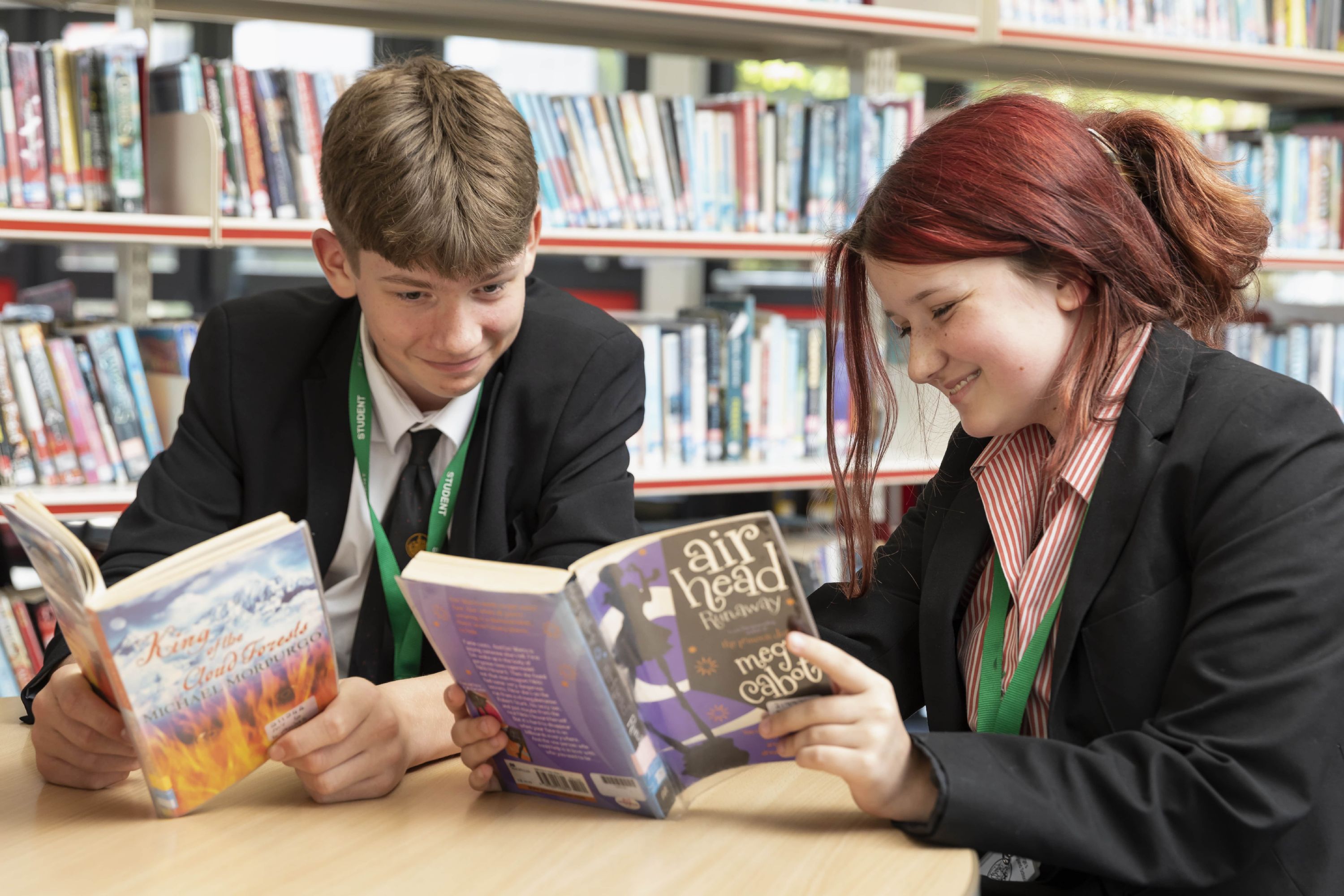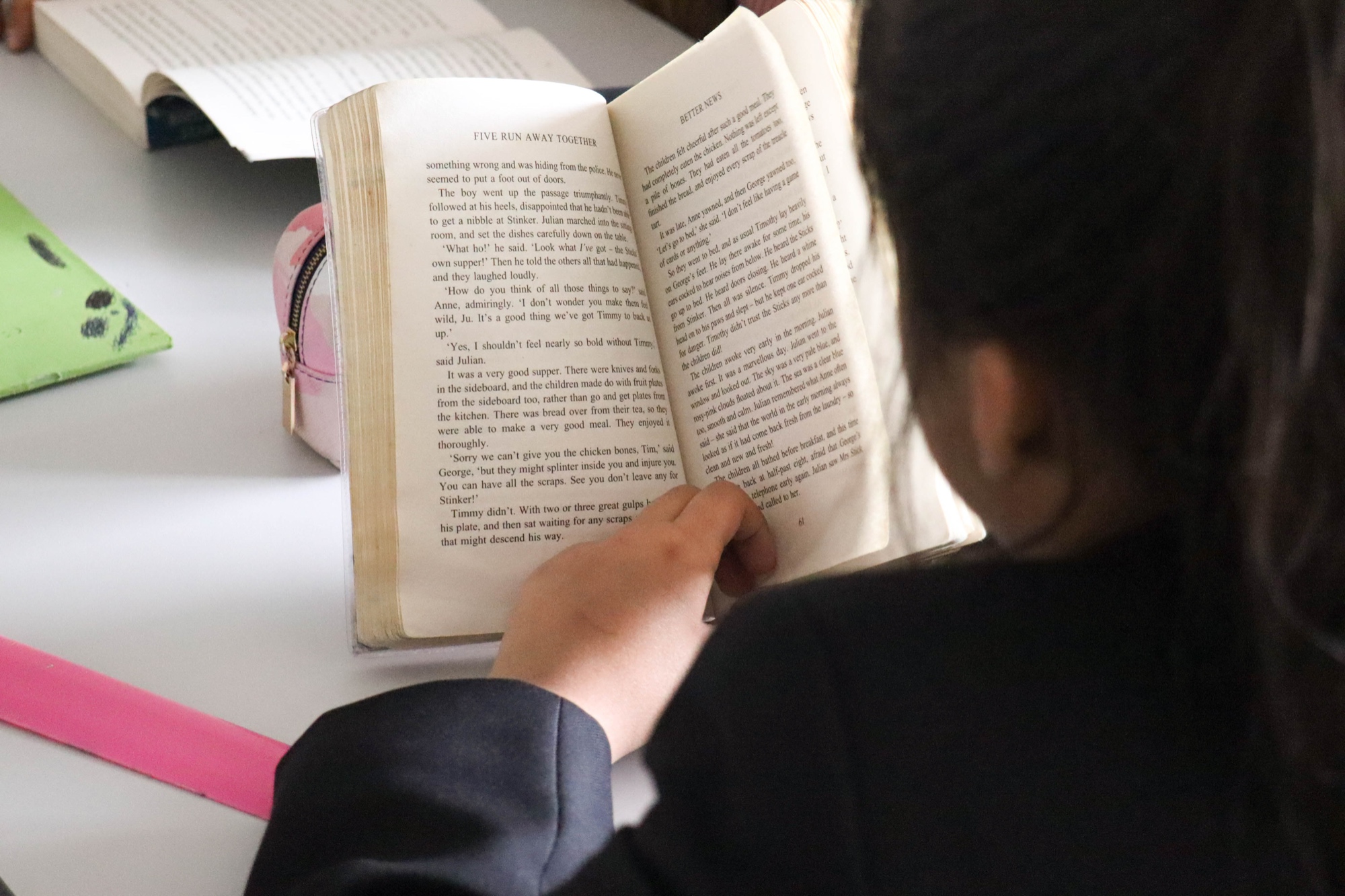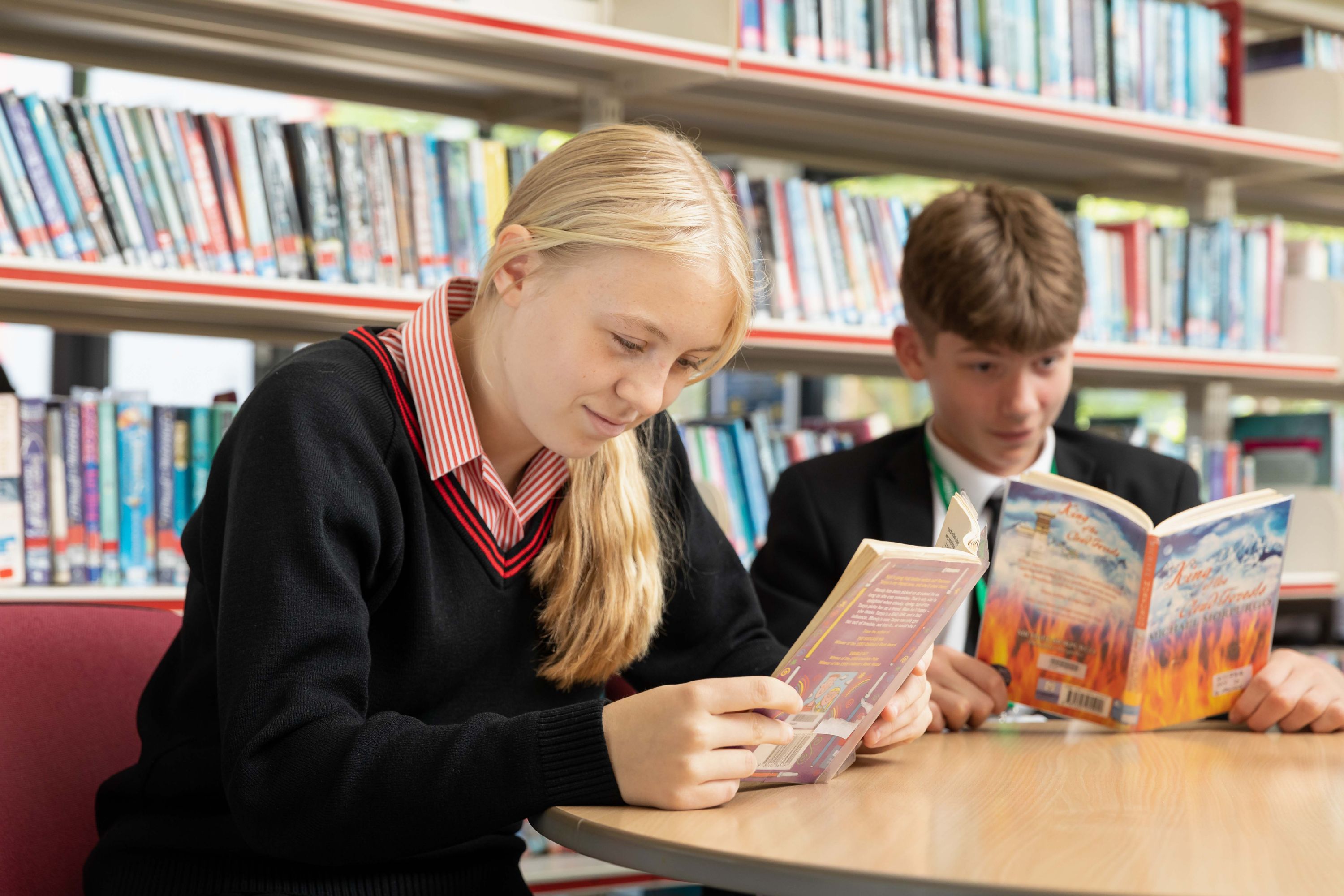English
Curriculum Leader: Mrs A Betts - bettsa@saintgeorgescofe.kent.sch.uk

As evident in our Learning Journey, we encourage every student to believe that they are a potential A-level student in our subjects. Every student is exposed to the best literature and non-fiction texts that will foster a love of reading and exploration of language. Our curriculum has been carefully planned to ensure that essential skills are revisited and built upon during the students’ time at Saint George’s.
View our English learning journey here
Intent
Our selection of rich and diverse texts has been shaped by our desire to build empathy, compassion, and thankfulness in our students. Our curriculum has been structured to allow students to explore a range of cultural experiences through texts. They will develop and thrive intellectually, socially, culturally, and spiritually in order to live life in all its fullness.

Implementation

We see the curriculum as a journey, building on knowledge from KS2. Making connections over time, we expose students to a range of high-quality and suitably challenging poetry, novels, drama, and non-fiction, reflecting the makeup of our school community. KS3 students will have weekly library lessons, following the Accelerated Reader programme, supporting all pupils to flourish across the whole school curriculum, KS4, and beyond.
We ensure that SEND and disadvantaged children are given the necessary support in class to fully access the Curriculum and that equal opportunities are given to all.
Impact
Through the study of a range of texts promoting the school’s ethos, pupils will leave with a broad understanding of Literature through time and how language has and continues to evolve. Our students will develop empathy and resilience, and be prepared for life beyond the school gates.

English in Key Stage 3 (KS3)
Per fortnight: 7 Lessons (including 2 library lessons)
Year 7: We introduce students to the chronology of storytelling and literature. We begin with myths from across the world and of different faiths. We move on to ‘Beowulf’ and ‘The Canterbury Tales’ to understand the transition from oral storytelling to written language. Shakespeare then allows us to appreciate how written stories have spread throughout the world. The year ends with the exploration and analysis of a modern novel.
Year 8: Gives us the opportunity to look in greater depth at texts and the language that students need to experience before taking GCSE. They will look at Victorian literature and Gothic short stories. They will also study War literature to coincide with their studies in history. Pupils will analyse a range of poems from different cultures surrounding the theme of identity, before ending the year with a film unit. This not only allows students to apply their analytical skills to a different medium but also gives students a taste of potential future A Level courses.
Year 9: This sees the gradual transition into KS4. The focus of this year is ‘Power’. Students continue to build on their understanding of Shakespeare from year 7, with a closer study of a second Shakespeare play. Pupils will study a modern drama text to familiarise themselves with dramatic conventions and ‘power in the novel’ is then explored through a range of classic and modern texts. In the final term of year 9, students will be given their GCSE poetry anthology and begin their study of ‘Power and Conflict’ poetry for the GCSE Literature exam.
English Literature and Language in Key Stage 4 (KS4)
Year 10: This begins with non-fiction extracts relating to Victorian times. From this, we build skills to access Language exam papers and lead on to our study of ‘A Christmas Carol’. Students will then move on to study further poems from their ‘Power and Conflict’ Anthology. In term 3, Students will study the modern drama ‘An Inspector Calls’. To accompany this, there will also be non-fiction texts which consider power in society and allow language papers to be explored. In term 5, students will complete their study of poetry and prepare for their end-of-year PPEs.
Year 11: This final year is structured around two series of PPE exams. The first of these is in November. We start the year with the study of our Shakespeare text for Literature GCSE. This, along with a language paper, forms the November PPE. Students will then begin revision of ‘A Christmas Carol’ and language papers, ready for the February PPE. Following this, the rest of the year will be ongoing revision of knowledge, skills and exam techniques to prepare students for their final English Literature and English Language examinations.
All students will gain two qualifications: GCSE English Language and GCSE English Literature (both AQA). Coursework is no longer required for the two courses.
GCSE Assessments
GCSE Language – 100% exam.
- Paper 1 – Fiction.
- Section A – 4 questions on an unseen piece of fiction;
- Section B – a creative piece of writing.
- Paper 2 – Non-Fiction.
- Section A – 4 questions on two pieces of unseen non-fiction;
- Section B – own piece of non-fiction writing.
The Language course also requires students to submit a Spoken Language Endorsement which is held in school and students will be awarded a Pass, Merit, Distinction or Ungraded. This has no weighting against the final grade for GCSE English Language.
Exam Board: AQA English Language
GCSE Literature – 100% exam.
- Paper 1: teacher choice of Shakespeare's text and A Christmas Carol.
- Paper 2: An Inspector Calls, AQA Poetry Anthology: Power and Conflict, Unseen Poetry.
Exam Board: AQA English Literature
English Future Paths
Students can progress further to obtain an A Level in English Language or an A Level in English Literature.
Some examples of careers with an English degree include; Journalist, Copywriter, Teacher, Paralegal, Marketing Executive, Editor, Museum Curator, Freelance Writer, Librarian, Publisher, Web Editor, Author, Social Media Manager and PR manager. But this list isn’t exhaustive; there are numerous other careers in fields where strong communication and written English skills are top priorities. For example within sectors such as media, advertising, law, retail and leisure.
There are also plenty of companies that recruit English Literature graduates. PR agencies such as Edelman and Brunswick and publishers like Penguin Random House and Harper Collins have a range of editorial, writing and content management roles.
Extra Resources
- BBC Bitesize: KS3 English
- BBC Bitesize: A Level in English Literature
- BBC Bitesize: A Level in English Language
Revision Materials
Saint George's CofE School holds many copies of CGP Revision Guides at a fraction of the cost of the RRP. These are always in school, ready for purchase.
